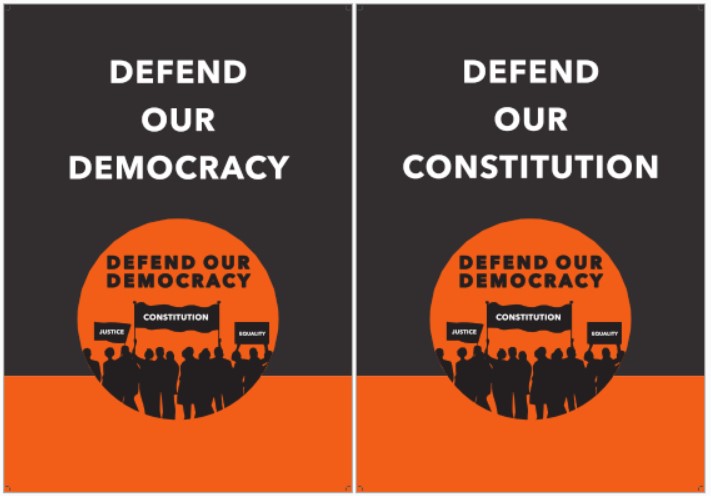The webinar aims to bring knowledgeable people together and unpack the situation Photo Twitter @ForDemocracySa
South Africa – Defend Our Democracy has organised a webinar on July 11th to mark the African Union’s Anti-Corruption Day and reflect on the recommendations of the Zondo Commission. The aim of the webinar is to bring together knowledgeable speakers who can shed light on why these recommendations have not been fully acted upon, one year after their release.
The webinar will have various speakers who will be delving into the Zondo Commission in an attempt to shed light on the reasons behind the delayed implementation of the Zondo Commission’s recommendations, explained Zaakirah Vadi, Defend our Democracy.
The speakers for the event
One of the speakers is Paul Holden, author of the recently released book “Zonda at Your Fingertips,” who will be providing insights into the extensive scale of the Zondo Commission. His book serves as a comprehensive resource that highlights the sheer volume of evidence and documentation accumulated during the commission’s proceedings.
“[His book] really begins to put into perspective just the scale of the Zonda Commission. It just speaks about the volumes of paper and the kind of technical storage that’s required for the Zondo Commission files in totality and all of the evidence that was submitted before it. He then unpacks the various recommendations within the different themes of the Zonda Commission. So in SOE’s, what were the recommendations in relation to Parliament and what were the recommendations that were made for instance.”
Firoz Cachalia, the recently appointed head of the National Advisory Firm tasked with combating corruption, will also be part of the webinar and will share the perspectives of this new body. The National Advisory Firm, established by the presidency, aims to develop a national action plan against corruption.
“It’s quite a new body and it does include some members of civil society as well. Their role is really to implement a national action plan against corruption, and we want to get a sense from him if this plan and if their thinking aligns to the thinking of the Zonda Commission. Whether there’s any symbiosis between all that has been recommended in the commission and what they are planning to advise the presidency to do.”
Cynthia Temple, a whistleblower and facilitator, will also be at the webinar. She was recently elected on to Defend Our Democracy’s National Committee as one of their members and will leverage her personal experience and expertise to moderate the discussions during the webinar. Having faced threats and adversity for her courageous actions, Temple brings valuable knowledge on the challenges whistleblowers encounter and the importance of their protection. Her insights will enrich the conversation surrounding state capture and corruption, said Vadi.
SMread: What could the opposition’s National Convention achieve?
Assessing progress and public expectations
One year after the release of the report, the public has high expectations regarding accountability and the fight against corruption. The commission’s work has cost taxpayers over a billion rand, and there is a desire to witness significant consequences for those responsible for state capture and corruption. However, many argue that the top-level individuals implicated in these crimes have not faced adequate accountability.
“This is one of the consistent arguments that is being put forward through the National Prosecuting Authority (NPA) on a consistent basis. We have to see some of the key engineers of state capture begin to face some sort of accountability and particularly those within the political sphere. Recently in Parliament one of the members who were implicated in the report had a kind of a slap on the wrist accountability mechanism imposed on him for something that he had done. We don’t want to see that sort of thing. We really are calling for orange overalls for those who are involved.”
The expectation for visible changes and a sense of hope in South Africa’s future remains strong. Although the NPA plays a vital role in prosecuting cases, it should be noted that investigative work primarily falls under the jurisdiction of the police services. However, corruption and state capture have deeply affected these institutions, further complicating the process. The public’s demand for justice is justified, but it is crucial to acknowledge the challenges faced by the NPA and the broader system within which it operates.
“Once a person is arrested and all of that investigative work is done and that goes to the NPA, the NPA has to decide whether to prosecute or not prosecute and to pull together a watertight case. They are working as part of a broader system and that system in some instances itself has been really hammered over the last 10 to 15 years in our country. The public has an absolute right and should continue to work for orange overalls but at the same time, I can understand the kind of pressures that the NPA is working under.”
Zaakirah Vadi engaged with Julie Alli on the upcoming elections, exploring presidential accountability, societal response to recommendations made by the Zondo Commission, and the imperative of accountability and transparency in political processes. Listen to the discussion here:
